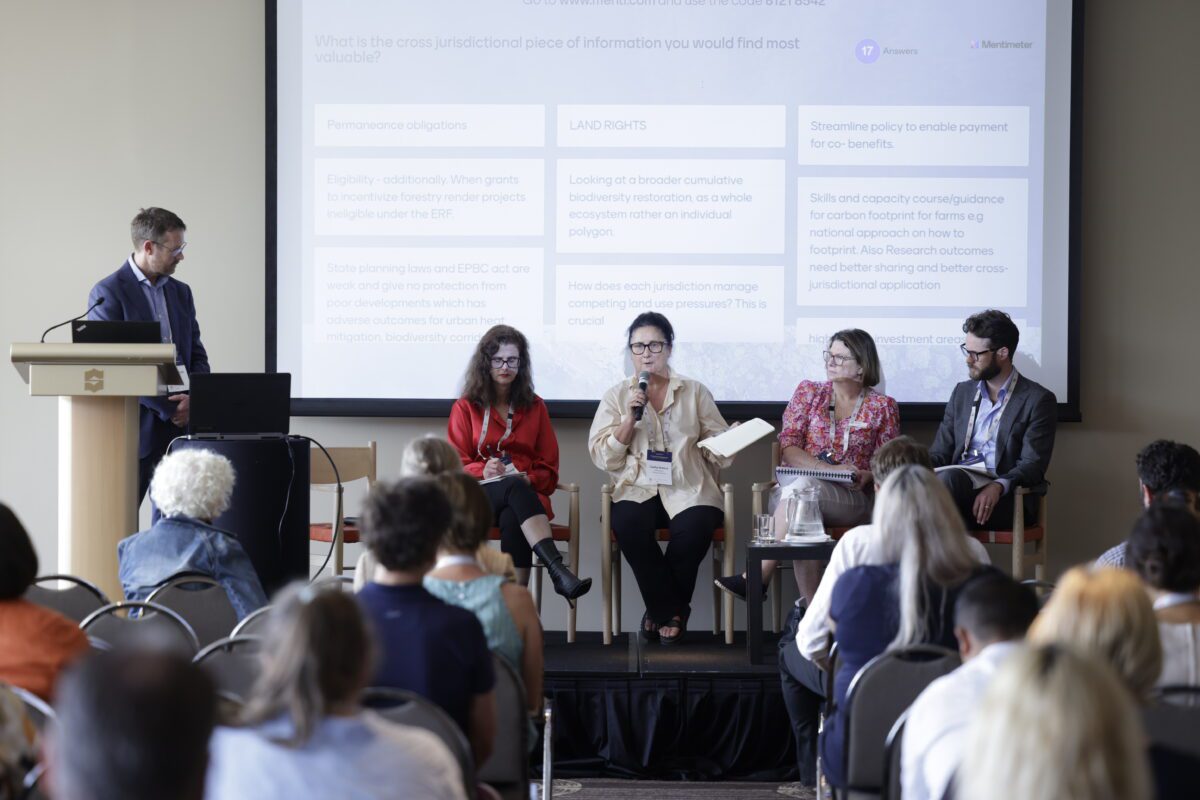- Countries and companies now recognise that the economic benefits of accelerating the transition vastly outweigh the cost, while community expectations continue to rise for greater climate ambition.
- A higher integrity carbon market ecosystem is emerging in response to Australian and global reviews and criticisms, and there is a shift in how companies use and choose carbon credits – from a focus on carbon neutrality to net zero alignment within and beyond company value chains.
- Australia is expected to become one of the largest producers of carbon credits in the world, with ACCU demand forecasted to peak at 31 million units in 2031. However, under a 1.5 degree scenario, it will require a significant increase of up to eight times the current level of land-based sequestration by 2050.
Released today, the inaugural CMI-Westpac Carbon Market Report 2024 “Carbon Markets and Australia’s Net Zero Challenge” provides a comprehensive analysis of the state of the carbon market and its contribution to net zero targets, as well as the importance of current reforms to carbon credit integrity and large emitters’ responsibilities, said the Carbon Market Institute (CMI).
Developed with the support of Westpac, the new annual series examines how Australia’s carbon market is evolving, with the latest insights from a range of experts, including decarbonisation researchers, nature specialists, corporate lawyers, carbon market participants, financial market specialists, technology specialists, and decarbonisation advisors.
CMI CEO John Connor said that report reflects a strong consensus on the need to reach net zero by 2050, however warns that countries and companies risk falling short of this milestone without urgent action that harnesses the power of market-based mechanisms.
“After a turbulent few years, we are entering a critical stage in the challenge of achieving net zero emissions by 2050. This is a goal that still has bipartisan support in Australia and in other countries. It is also backed by key agencies like the International Monetary Fund which recognise that the economic costs of inaction vastly outweigh the required investment.”
“Businesses have a crucial contribution to make, in taking responsibility for their own emissions and those within their supply chain, as well as going beyond this to meet their own net zero goals.”
“Taking these essential extra steps will involve the use of carbon markets, but too often we think about them in isolation, ignore how they have changed, and overlook further changes that are on the horizon. This report underscores the role they can play in contributing to the fight against climate change and biodiversity loss, both now and in the future,” he said.
Report highlights:
- Carbon Market Institute – 59% of Australians agreed it is important that all parties share strong 2035 targets and plans before the next election. There is also a broad consensus that businesses have a crucial contribution to make, with 77% of Australians expect businesses to take responsibility for all their emissions now or become carbon negative.
- Westpac – The Australian carbon market is in the process of building the necessary infrastructure and governance which should promote the efficient management of risk and allocation of capital. Successful implementation of this infrastructure will ensure the market is able to scale and realise some forecasts of Australia becoming one of the largest producers of carbon credits in the world.
- Climateworks – Australia could need up to eight times the current level of land-based sequestration by 2050 under a 1.5 degree scenario. Policymakers cannot expect the carbon market alone to deliver the scale of additional sequestration required.
- S&P – ACCU demand is expected to jump to nine million units in 2024, due to Safeguard-liable buyers, and to peak 31 million units in 2031, before subsiding to 24 million by 2035. On the supply side, the government is projecting an issuance figure of 19 million in 2024, which it expects to rise to 31 million in 2033, it says.
- Aurecon – Demand for ACCUs is currently mainly from the Safeguard Mechanism and state and territory targets, but this is likely to increase as more sectors of the economy are required to decarbonise rapidly.
- The Australian Climate and Biodiversity Foundation – Nature repair will require three innovations in Australia; enable carbon projects that incentivise the protection and restoration of ecosystems; support infrastructure for nature repair markets that complement the carbon market, with a focus on strict standards and science-based measurement methods; and create a new public fund to kick-start nature markets.
- Gilbert + Tobin – The EU and California have mandated the disclosure of detailed information about the use of carbon credits, and other parts of the world are gradually moving toward mandatory disclosure on carbon credit use. Companies should arm themselves with a detailed understanding of the characteristics of the credits they use and develop business processes and systems to support more sophisticated due diligence and data disclosure.
- ASX – A suite of Environmental Futures Contracts will be launched to serve the markets for Australian Carbon Credit Units, renewable energy certificates, and New Zealand carbon units. These will scale-up carbon and renewable energy trading markets, accelerating the speed of the transition and lowering costs.
- The Indigenous Carbon Industry Network (ICIN) – as the peak body supporting First Nations engagement in the carbon industry, ICIN outlines the priorities for engagement with Indigenous peoples in the industry, with ICIN member organisations actively managing over 50% of Australia’s landmass.
- Trovio – as a digital registry services provider, Trovio describes how tamper-proof digital ledger technologies will provide a transparent, fully auditable framework for the entire lifecycle of carbon credits.
- Tasman Environmental Markets (TEM) – as Australia’s largest provider of voluntary carbon credits, TEM provides an update on the latest global voluntary carbon market integrity developments.
Access the report here.
About the Carbon Market Report
The 2024 CMI-Westpac Carbon Market Report, “Carbon Markets and Australia’s Net Zero Challenge”, is the first in a new annual series. The report examines how Australia’s carbon market is evolving, with the latest insights from a range of experts, including decarbonisation researchers, nature specialists, corporate lawyers, carbon market participants, financial market specialists, technology specialists, and decarbonisation advisors.
About the Carbon Market Institute
The Carbon Market Institute (CMI) is a member-based institute accelerating the transition towards a negative emissions, nature positive world. It champions best practice in carbon markets and climate policy, and its 150+ members include primary producers, carbon project developers, Indigenous organisations, legal, technology and advisory services, insurers, banks, investors, corporate entities and emission intensive industries. The positions put forward constitute CMI’s independent view and do not purport to represent any CMI individual, member company, or industry sector.



